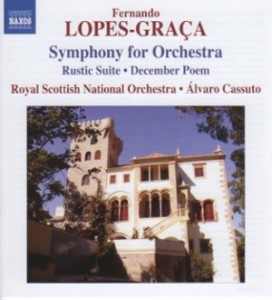Portuguese composer Fernando Lopes-Graça (1908-93) is a difficult composer to pigeon-hole. His symphony in particular starts off a bit like Honegger’s First (sound clip below), but the neoclassical cut and thrust of its themes and rhythms, ostensibly owing something to Stravinsky, has the composer sounding more like his Latin American colleagues than his European brethren. Perhaps the most appealing single movement is its central Intermezzo, while the final Passacaglia, based on a very short theme, is equally short-winded, although it contains some very striking individual episodes when it takes the time to be a bit more expansive. Composed in 1944, this is a very interesting if nonetheless inconsistent work, and it’s well worth your attention.
Among the remaining pieces, the most intriguing is the Suite Rústica No. 1 (1950), a six-movement occasional work that manages to live up to its title without any obvious folkloric influences—rather, any folk idioms have been wholly absorbed into the composer’s personal style, much as was the case with Bartók. December Poem is a somber, reflective work whose free use of dissonance in a lyrical context makes for a bittersweet 10 minutes of introspection, while the Festival March is more combative than celebratory. Conductor Álvaro Cassuto has chosen these pieces wisely to display Lopes-Graça’s compositional range, and has compiled an excellent introduction to his art. As we have come to expect in this ongoing series, he also gets excellent results from the orchestra, and is very well recorded. Hopefully there’s more to come.
































